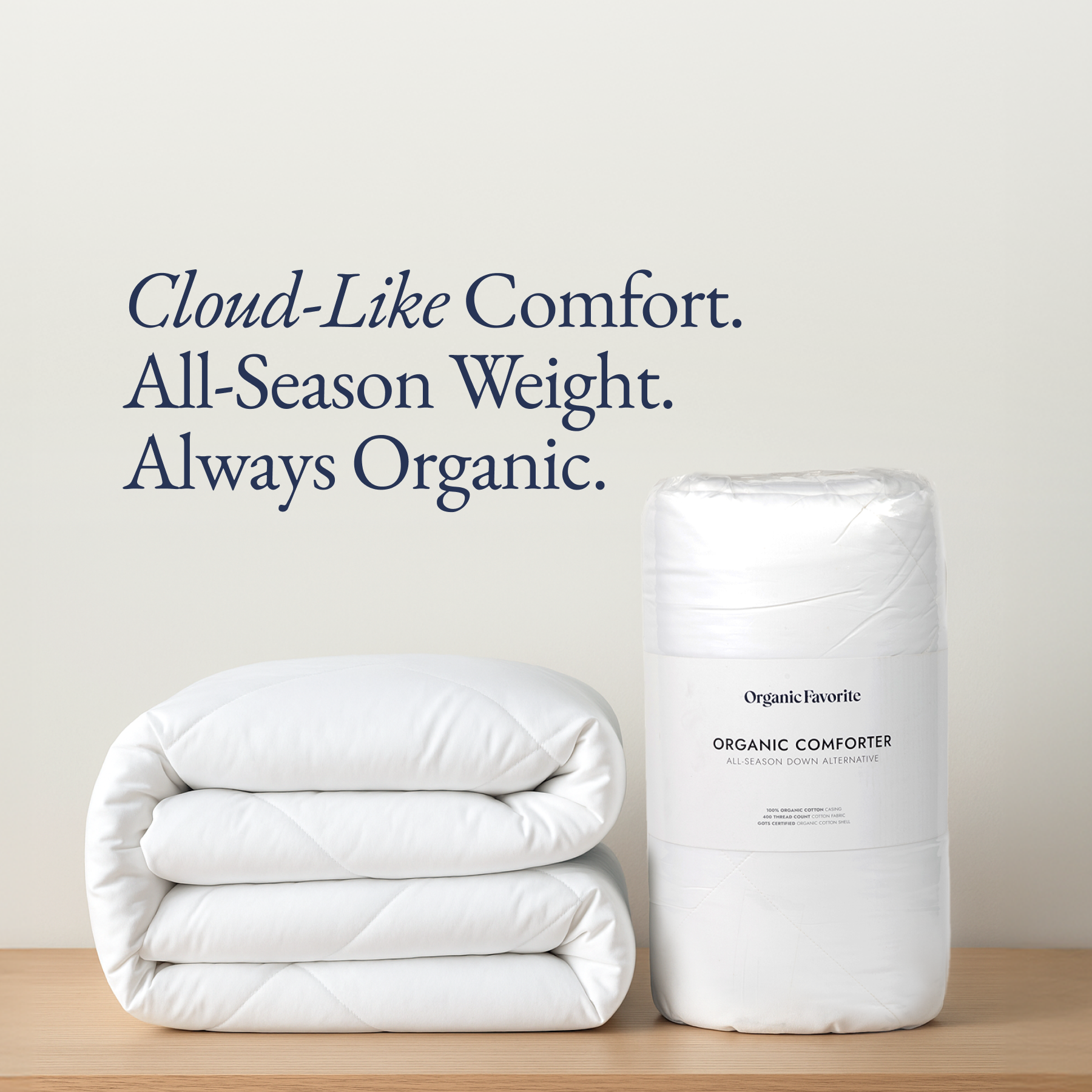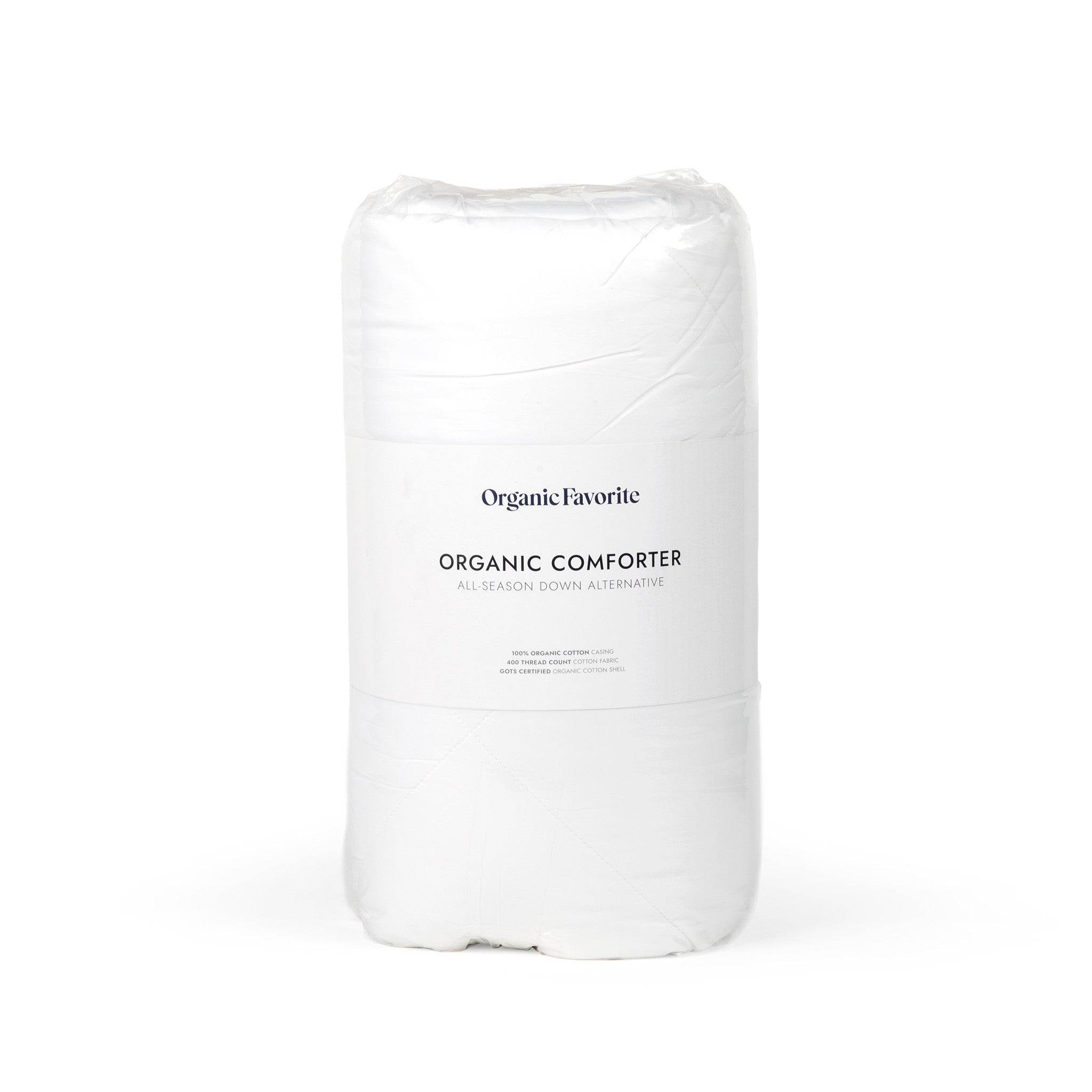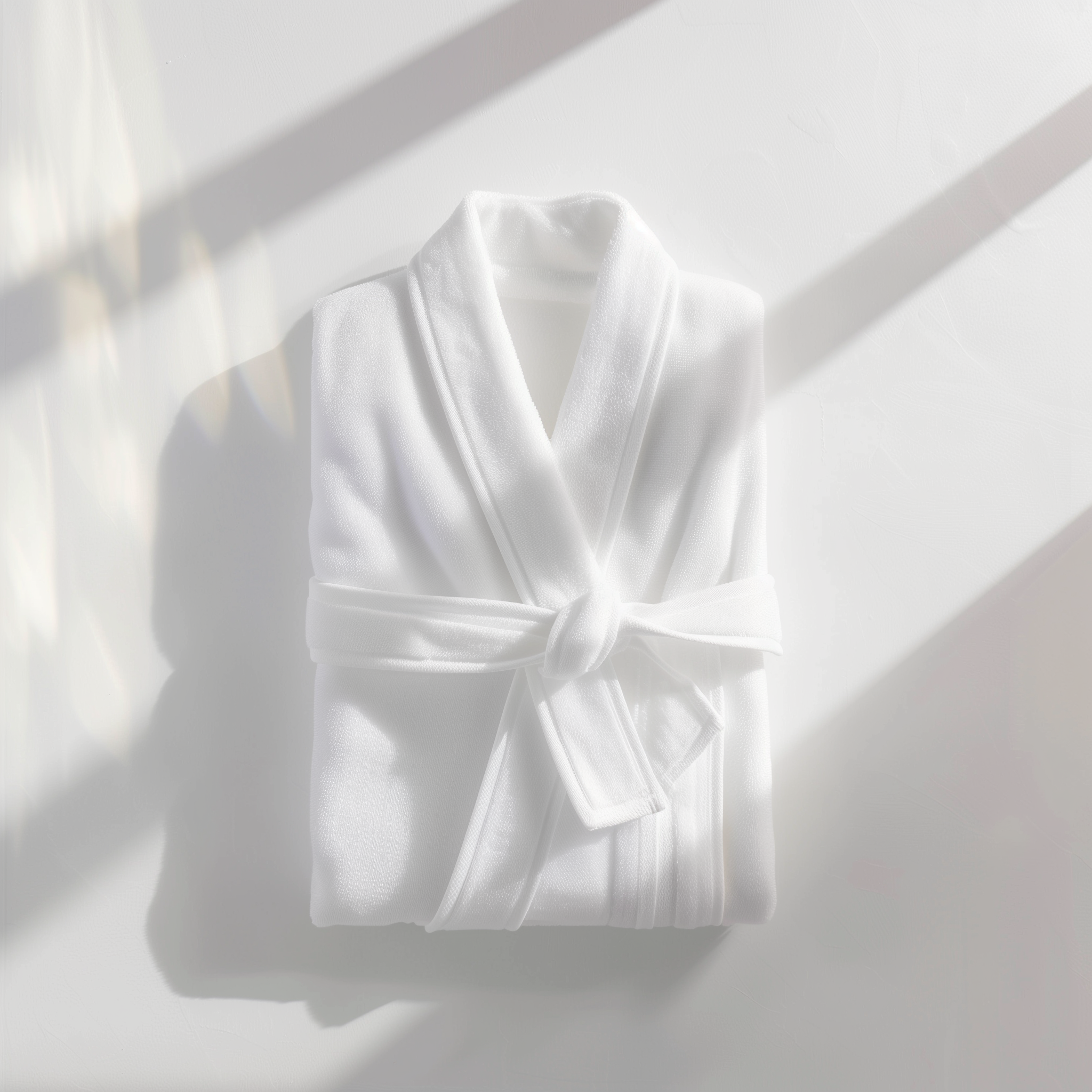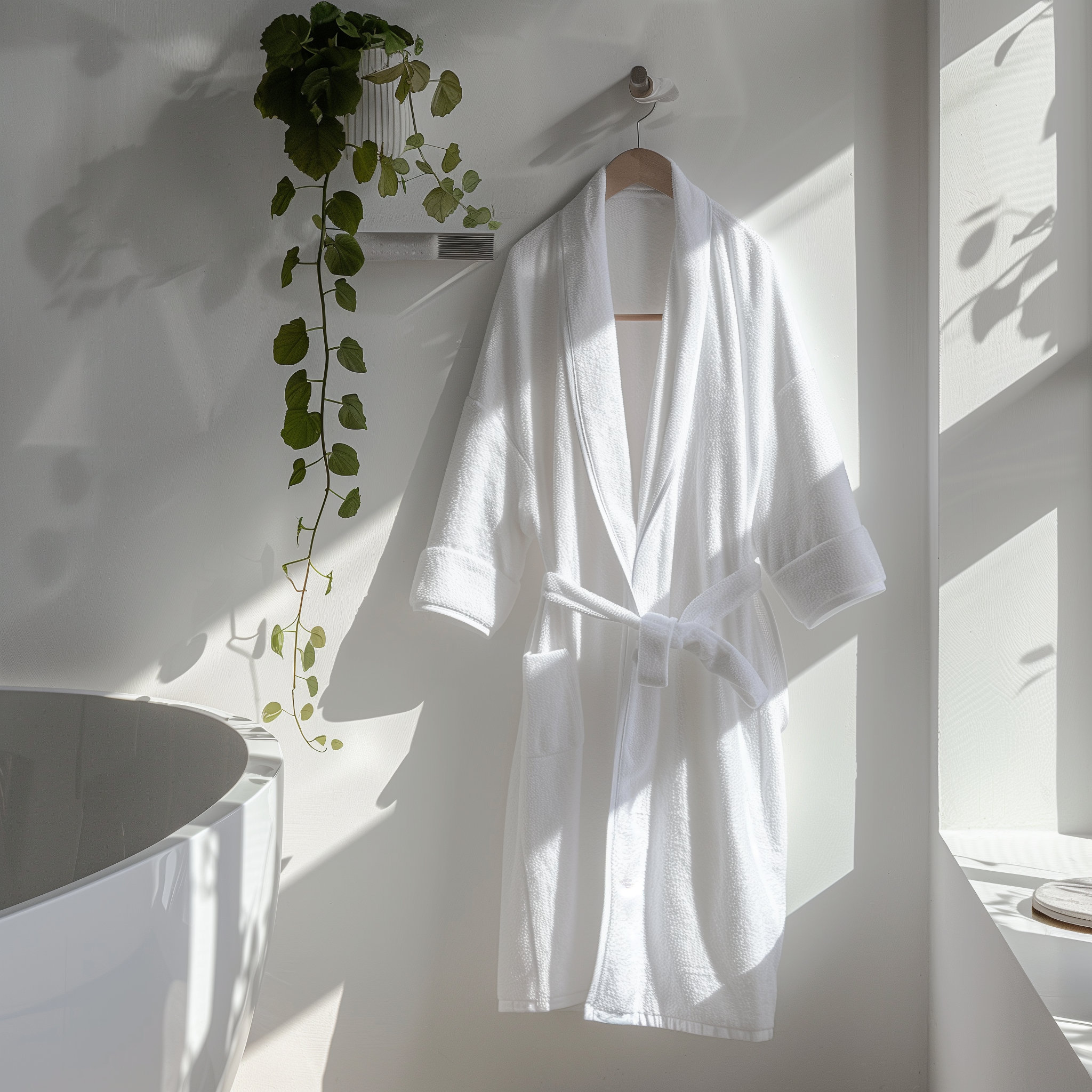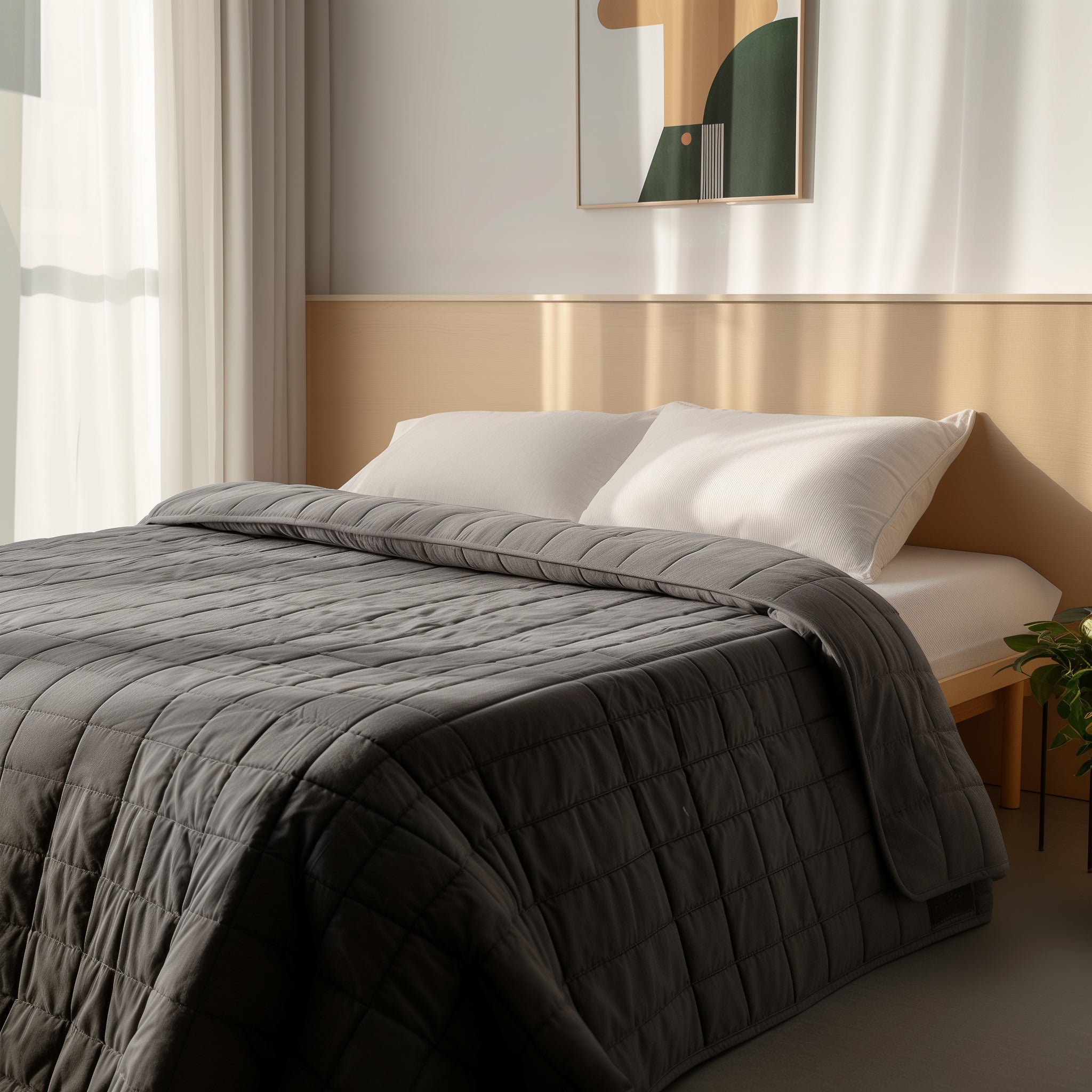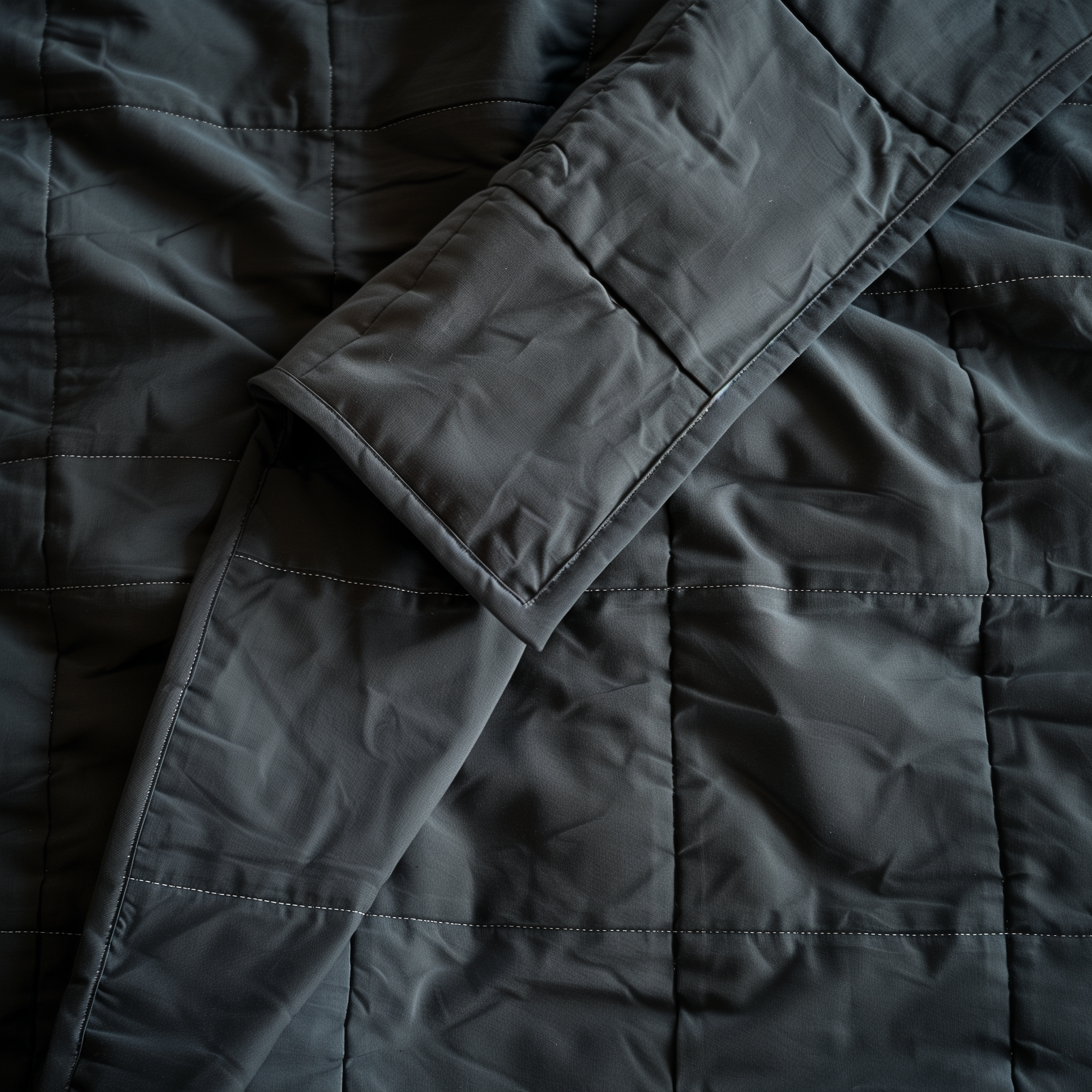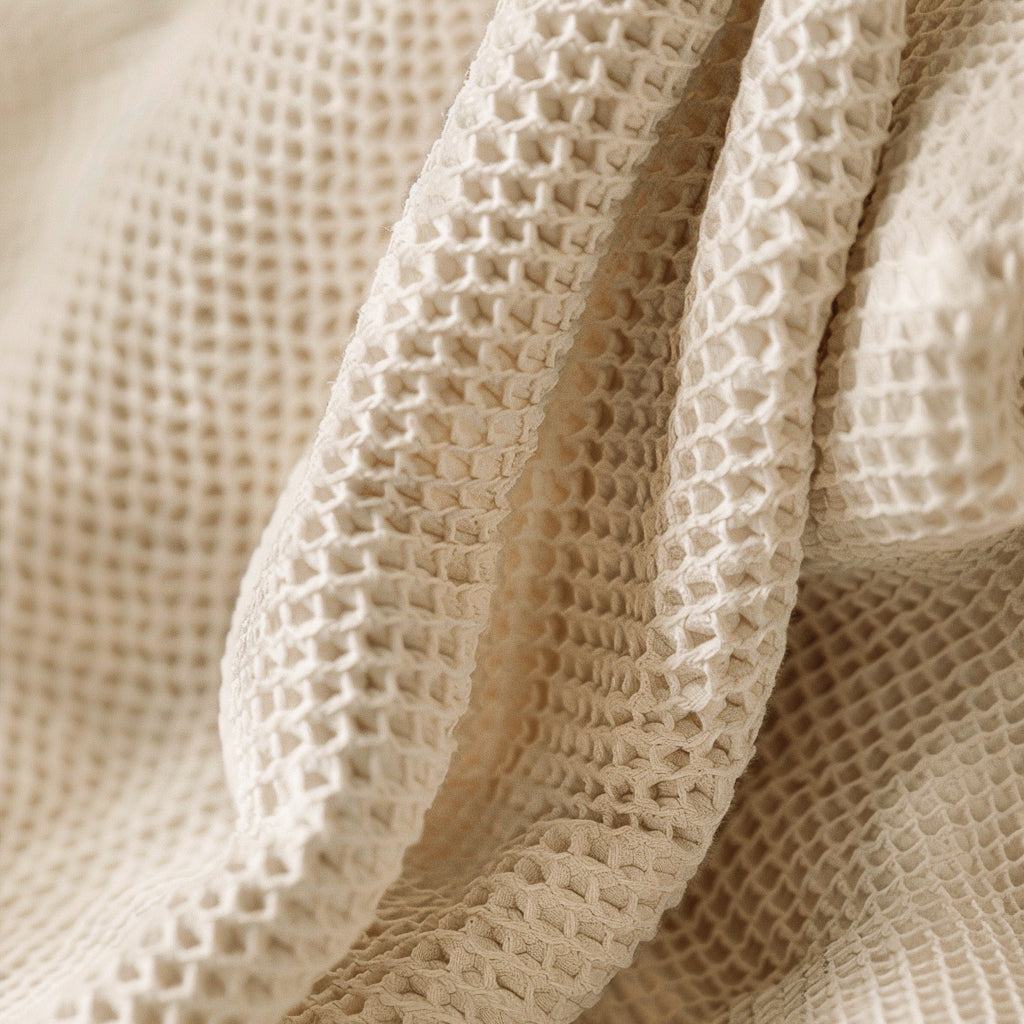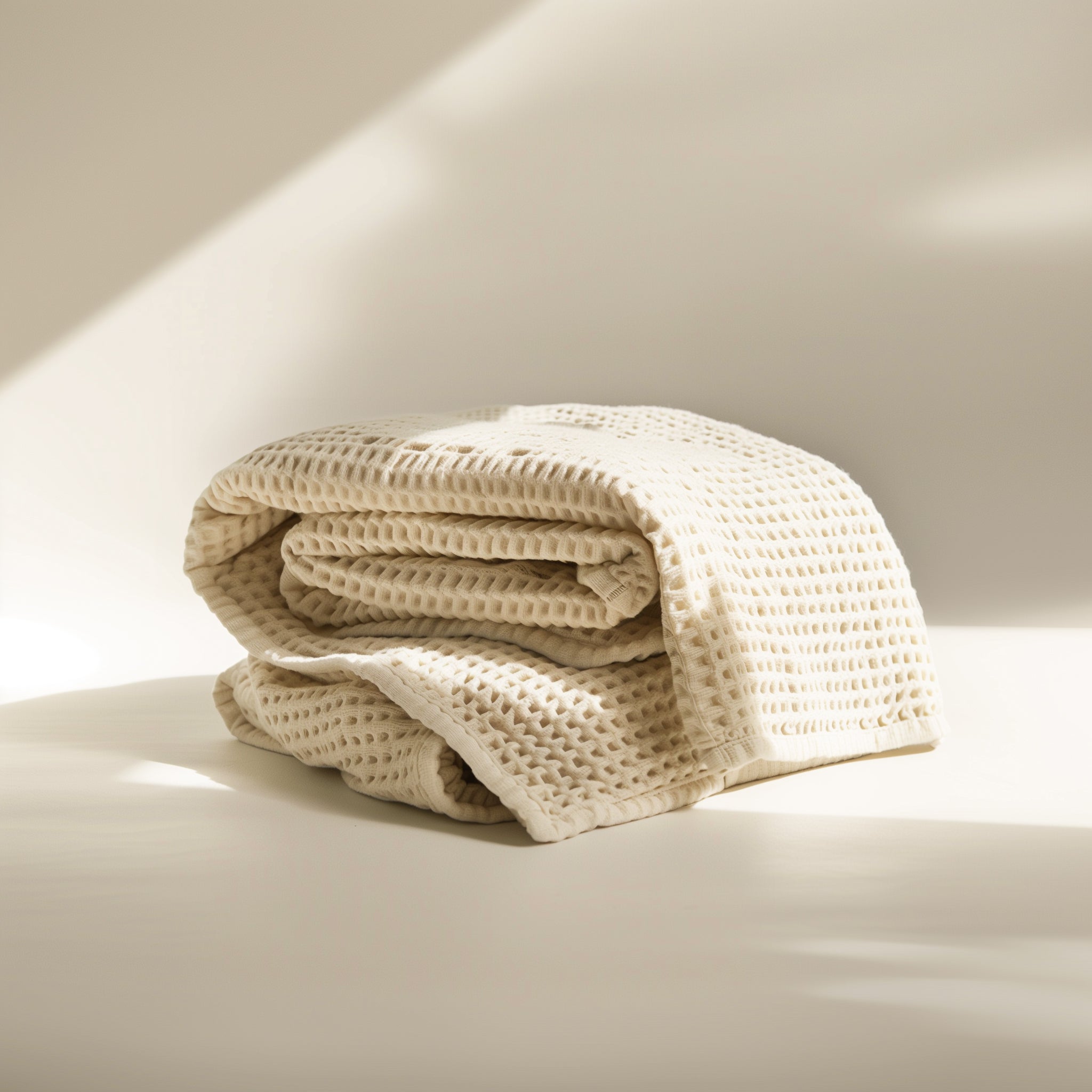In this article, we explore cotton vs. microfiber bedding. One is natural and breathable. The other is made of plastic.
Getting quality sleep is vital for our overall health and well-being. Yet many of us struggle to get the recommended 7-9 hours each night, even when we have every intention of prioritizing rest. One often overlooked factor disrupting our slumber? The very materials we surround ourselves with each night.
I remember when I first started exploring more eco-conscious bedding options. It felt like such a small detail, but once I switched to organic cotton sheets, I noticed an immediate difference in how refreshed I felt upon waking. The cooler, more breathable material helped regulate my body temperature throughout the night, preventing the clammy restlessness that plagued me with conventional (often poly microfiber) sheets.
Whether you suffer from night sweats, allergies, or simply prefer ultra-soft bedding, understanding key material differences can have a profound impact on your sleep quality. Let's dive into the merits of cotton versus microfiber sheets so you can make the best choice for your comfiest slumbers yet.
Cotton vs. Microfiber: Breaking Down Key Differences
At their core, cotton and microfiber sheets differ in their fundamental makeup—one is a natural fiber, the other is a synthetic material. Both come with their own set of advantages and considerations:
Cotton: Derived from the cotton plant, these sheets are comprised of natural cellulose fibers. Their breathable nature allows air to circulate freely, helping wick away moisture and prevent overheating.
Microfiber: Made from extremely fine synthetic fibers (like polyester), microfiber sheets are tightly woven for an ultra-soft feel. Often derived from plastic. Because of this the synthetic structure can lead to poor breathability, trapping heat and moisture against your body.
With such contrasting materials, it's important to understand which factors—temperature regulation, overall comfort, easy care—matter most for your sleep needs. Cost and environmental impacts should be weighed as well when choosing sheets that will drape your bed for years to come.
Addressing Sustainability Concerns
The idea of sleeping on pesticide-sprayed sheets (conventional cotton) or sheets derived from plastic (microfiber) highlights a significant sustainability concern.
Let's acknowledge the potential sustainability drawbacks of both materials.
Conventional cotton farming can be notoriously water-intensive and reliant on harmful pesticides and fertilizers. However, sustainably grown organic cotton aims to reduce those negative impacts.
As for microfiber, its synthetic nature raises questions around plastic content and biodegradability. Truly eco-conscious consumers may wish to consider more planet-friendly fabrics beyond these two popular options.
With a thoughtful approach, it is possible to find bedding that delivers sublime comfort and sustainability in one soft, sumptuous bundle. To get you started, let's examine the unique merits of cotton and microfiber in more depth.
The Breathable Allure of Cotton Sheets
There's a reason cotton has reigned as the bedding fabric of choice for centuries. This gloriously breathable material remains unmatched in its ability to keep sleepers feeling perfectly temperate and dry all night long.
How Cotton's Natural Fibers Promote Airflow
At the molecular level, cotton is comprised of hollow cellulose fibers that create tiny pockets of air within the fabric's weave. This ingenious natural structure is what allows cotton sheets to wick moisture away from your body while simultaneously promoting airflow.
"When we sleep, our body temperature naturally fluctuates between warm and cool phases," explains Dr. Kyra Bremer, a sleep researcher at Stanford University. "Cotton's breathability helps stabilize our temperature shifts by absorbing sweat and releasing heat, preventing restless awakenings."
In other words, cotton's unique makeup allows it to act like a personal climate control system, finely tuned to the needs of your slumbering body. No more waking up in a sweat-soaked tangle of bedding, or shivering through chilly nights—simply wrap yourself in cotton's cozy equilibrium.
The Plush, Time-Honored Comfort
Beyond its thermoregulating talents, cotton also delivers undeniable snuggle-worthy softness in an array of coveted varieties. Whether you prefer the crisp, cool handfeel of a percale weave or the subtle sheen of ultra-supple sateen, cotton offers an irresistibly plush slumber experience for every taste.
For the pinnacle of cloud-like indulgence, long-staple Egyptian cotton remains the gold-standard, hailed for its exceptional durability and fine, silky fibers. But even more modest cotton varietals like upland provide unrivaled comfort you just can't achieve with synthetic fabrics.
"There's something so warm and comforting about being cocooned in pure, soft cotton," muses interior designer Rebecca Williams. "It has this nostalgic quality that instantly relaxes the senses and prepares the mind for sleep."
Exploring Organic Cotton: A Healthy, Eco-Conscious Choice
While you can certainly find affordable, high-quality conventional cotton bedding, exploring organic options offers both personal and environmental advantages. By definition, organic cotton is grown without any synthetic fertilizers, pesticides, or other harsh chemical treatments—eliminating potential toxins from your sleeping sanctuary.
Even better, organic cotton farming emphasizes sustainable practices to nurture soil health and biodiversity while reducing overall water usage. By choosing certified organic sheets like those from organic favorite, you're not only treating your skin to sumptuous luxury, but also supporting an eco-friendlier tomorrow.
"Our organic cotton is GOTS certified, so customers know they're getting pure, chemical-free fibers," explains Sara Marrow, sustainable textile specialist at organic favorite. "Plus, the way it's grown protects precious resources, providing a truly guilt-free indulgence."
If plush breathability, time-honored comfort, and eco-consciousness appeal to your bedtime desires, cotton sheets could be just the dreamy upgrade you've been craving. But for those who crave extra convenience and silky softness, let's explore the case for microfiber next.
The Convenient Case for Microfiber
One of the biggest draws of microfiber sheets is their budget-friendly accessibility. Typically crafted from polyester-based threads, these durable sheets can be produced en masse at a fraction of the cost of premium cotton varieties, while still delivering that sought-after silky handfeel.
What really sets microfiber apart is its low-maintenance nature. Thanks to its wrinkle-resistant and quick-drying properties, these sheets can breeze through the laundry with ease—no iron, special detergents or fancy drying settings required.
"You just can't beat microfiber when it comes to easy care," raves Alicia Thompson, a textiles reviewer. "I don't have to fuss with delicate wash cycles or fabric-safe bleaches. I just toss them in the machine and they come out feeling like new each time."
So for busy households, apartment dwellers without in-unit laundry, or frequent travelers seeking an effortless hotel-like experience on the road, microfiber offers a compelling fuss-free slumber solution to consider.
Assessing Breathability: Can Synthetic Match Cotton's Cool Factor?
Of course, the biggest potential downside to microfiber's synthetic construction lies in breathability—or lack thereof.
Since the fabric isn't comprised of hollow, moisture-wicking natural fibers, it simply cannot provide the same temperature-regulating magic as cotton.
Some higher-end microfiber producers attempt to replicate cotton's airy appeal through specialized weaving techniques that increase surface area. But at the end of the day, the fabric's tightly woven polyester base means it will trap more heat and humidity than its natural fiber counterpart.
"For hot sleepers or those in warmer climates, microfiber likely isn't the ideal choice since it won't allow for that same free-flow ventilation," advises Bremer. "You're better off leaning into a breathable cotton to stay comfortable overnight."
So while microfiber devotees may argue their sheets mimic the pampering softness of high-end cottons, the jury is still out on whether this synthetic can truly match the natural cooling powers that make cotton such a sleep-friendly staple.
Microfiber's Environmental Issues
Beyond breathability, the other snag for microfiber is its plastic-based composition.
Since these sheets are derived from man-made polymer fibers like polyester, some eco-conscious consumers worry about the fabric's biodegradability and overall environmental impact.
While the jury is still out on microfiber's full effects, it's a valid concern worth addressing for sustainability-minded shoppers.
If you do opt for microfiber sheets, researching how the specific synthetic fibers are produced can help determine whether they represent a lesser evil compared to conventional cotton farming's water-guzzling tendencies.
"When shopping microfiber, look for fabrics made from recycled PET bottles or other reclaimed plastic sources to minimize virgin plastic production," recommends Marrow. "And of course, invest in long-lasting, well-made sheets to optimize your use."
Overall, microfiber represents an approachable middle ground for those seeking convenient luxury at a reasonable price point. While it may not tick every wishlist box in terms of breathability and sustainability, its soft, low-maintenance benefits could very well be a worthy trade-off for the right sleeper.
Speaking of making mindful trade-offs...
Uncovering the Best Bedding for Your Needs
After exploring the nuances of cotton versus microfiber, you may be struck by one simple realization: there is no definitive "best" material for everyone and every situation. The ideal bedding comes down to understanding your own unique priorities and finding the option that best aligns with those values.
Prioritizing Temperature, Ethics & Value
For some, temperature regulation takes top precedence. If you're a hot sleeper, suffer from night sweats, or simply reside in a toasty climate, a breathable cotton sheet like our Organic Cotton Sheet Set will keep you feeling dry and airy through the night. The all-natural fibers wick away moisture while encouraging free airflow around your body.
For others, sourcing ethics and sustainability weigh heaviest.
By opting for certified organic cotton sheets from brands like ours, you don't have to choose between luxury and environmental responsibility. Our GOTS-certified organic cotton is grown without the use of harmful chemicals or pesticides, while our fair labor practices create a more ethical product overall.
Then of course, there's good old budget-consciousness to consider. While premium cotton will always carry a higher price tag, microfiber provides a more approachable indulgence for luxuriously soft sheets without breaking the bank.
So rather than asking which material reigns supreme, the question becomes: What sheets will bring you the most restful, guilt-free satisfaction? Hone in on your biggest priorities, whether that's cooling performance, sustainability, long-term value, or simply finding attainable everyday luxury.
The Conscious Comforts of Organic Cotton
We've explored the extensive merits of cotton and how it compares to microfiber for your sleep needs. But if the notions of pure luxury and peace of mind resonate most, then organic cotton is undoubtedly the bedding material for you.
Empowering You to Rest Easier—Literally and Ethically
When investing in high-quality organic cotton bedding like our Organic Cotton Comforter, you're not only treating yourself to sumptuous comfort—you're making a conscious choice to embrace a cleaner, greener lifestyle through and through.
This plush, cozy comforter envelops you in a 400-thread count organic cotton sateen shell filled with a hypoallergenic synthetic down alternative. So while its lightweight warmth cocoons you in blissful softness, you can rest easy knowing zero harmful chemicals were involved in its creation or came anywhere near your sleep sanctuary.
In fact, our entire sourcing and production process meets rigorous GOTS certification standards to guarantee purity and ethical practices, from seed to stitch. It's bedding that doesn't just feel good, but lets you sleep good, too.
"There's something so deeply calming about being surrounded by certified organic materials at night," reflects Chris Jenkins, co-founder of organic favorite. "You're signaling to your mind and body that it's safe to fully relax and restore itself in a truly pure environment."
The Ultimate Effortless Indulgence
But don't just take our word for it—countless customers have discovered the difference our organic cotton bedding delivers compared to conventional fibers:
"I actually look forward to going to bed now that my sheets and comforter are organic cotton," raves loyal customer Jennifer M. "It's just nicer, softer, fresher...everything about the experience feels like an indulgence."
"As someone dealing with allergies and sensitive skin, these sheets have been life-changing," says Mateo R. in his review. "I wake up with zero irritation, and my bed finally feels like a safe, pure environment.
From the get-go, Chris and the organic favorite team set out to make organic bedding more than just a luxury splurge—their goal was to make it an effortless everyday indulgence that enriches your life one rejuvenating night's sleep after another. No complicated upkeep rituals, no sacrificing comfort, no reservations.
Just pure, unadulterated, certifiably good rest... that's 100% guilt-free.
Our Signature Organic Cotton Comforter: Breathable Sustainability
Crafting our best-selling Organic Cotton Comforter wasn't just about creating a cozy, soft place to nestle down for slumber. It was about innovating beyond organic cotton to raise the bar for truly sustainable bedding design.
While the breathable, GOTS-certified organic cotton shell provides a natural foundation for peaceful shut-eye, the premium synthetic fill brings an added dimension of environmentally-conscious performance.
"We chose a synthetic down alternative after carefully evaluating its total eco-impact," explains Jenkins. "It allowed us to retain the lofty, temperature-regulating properties of traditional down while eliminating any unethical animal-derived materials."
Not to mention the hypoallergenic ease of care: simply toss this comforter in the wash on a gentle cycle for a refresh. No special detergents needed for this hardy, long-lasting companion.
Cotton vs. Microfiber Summary
We think there's a clear winner here.
After diving deep into both materials, it's clear that cotton—particularly organic cotton—emerges as the superior choice for truly restorative sleep. While microfiber may tempt budget-conscious shoppers with its lower price point and easy care, it simply can't match cotton's natural magic when it comes to the elements that matter most: breathability, temperature regulation, and sustainability.
Cotton's hollow natural fibers work like your own personal climate control system, wicking away moisture and maintaining that perfect sleep temperature throughout the night. Its time-honored comfort and incredible softness only improve with each wash, creating an inviting sleep sanctuary that feels as good as it is for the planet.
While microfiber certainly has its conveniences, its plastic-based composition raises valid environmental concerns and its poor breathability can lead to those dreaded night sweats.
For those ready to prioritize both restful sleep and environmental responsibility, the choice becomes beautifully clear: cotton sheets are the dream-worthy upgrade your bedroom deserves.


